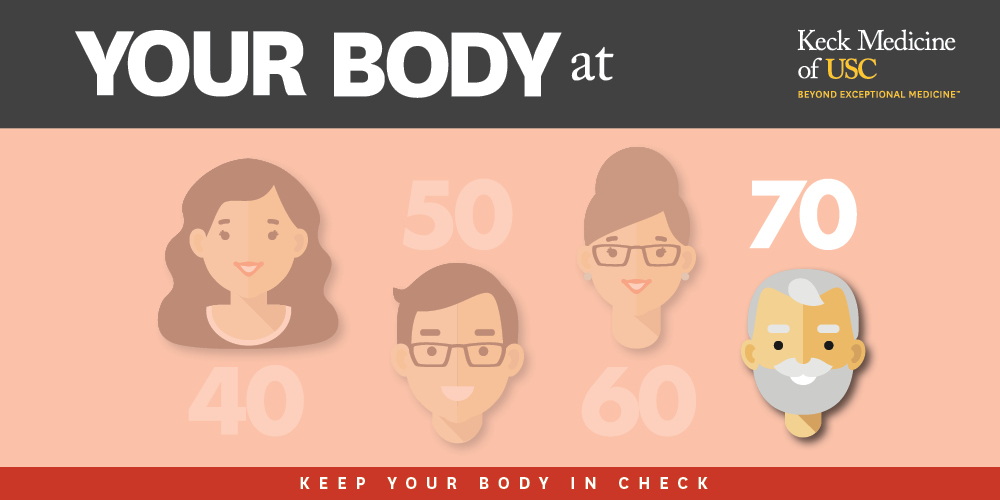
Who says you have to ‘age out’ of good health? With modern medicine and healthy choices, you can stay fit for life.
Look around at your friends in the silver fitness class or on the bike path. Check out who’s consulting at your workplace or offering coaching services in the community. They’re people just like you, who haven’t let age stop them — in fact, they’re gaining energy and peace of mind from their activities. Getting older doesn’t have to signal a decline; in fact, the more active you stay, the healthier and happier you’re likely to be. Of course, your 70s may bring some changes you’ll want to understand and look out for.
You’re all ears, so why are you straining to hear?
What to expect: According to the National Institutes of Health, it’s not unusual for people in their 70s to have some degree of hearing loss. It usually results from a combination of long-term noise exposure; medical conditions and diseases, such as high blood pressure or diabetes; and genetic risk.
“Age-related hearing loss is very common in people over 70,” says John S. Oghalai, MD, an otolaryngologist at Keck Medicine of USC and chair and professor of otolaryngology – head and neck surgery at the Keck School of Medicine of USC. “Many times, the first symptom of hearing loss is either tinnitus (a ringing or buzzing in the ear) or difficulty understanding what people are saying in a noisy environment, such as a restaurant.”
What can help: “Modern hearing aids often can provide tremendous relief for these symptoms, and they can be nearly, or even completely, invisible,” Oghalai says. An appointment for a hearing test and ear, nose and throat (ENT) evaluation is the first step toward treatment. If your hearing loss is severe, which luckily is quite rare, no need to lose hope. A cochlear implant could be the answer.
You may develop a new look: squinting
What to expect: Our vision begins to change in our 40s, when we may need glasses to see things up close — and continues to change throughout our lives. In our 70s, age-related eye conditions such as John S. Oghalai, MD may affect us, or we may become sensitive to glare.
That’s not all. People who have diabetes may be susceptible to diabetic eye disease, a complication that could lead to blindness if not detected early. And for women, hormonal changes after menopause may lead to dry eye, characterized by a decline in the quantity and quality of tear production.
What can help: Early detection is critical when it comes to age-related eye conditions, as it can reduce the severity of their effects. An annual eye exam and proper care can put you back on the road to an active life. As for dry eye, medications are available, but you can also reduce the symptoms by cutting back on screen time and taking breaks to rest your eyes.

Osteoporosis may take a swing at your golf game
What to expect: Some people may think of osteoporosis as affecting only women, and in fact, it is more commonly diagnosed after menopause — but, by the 70s, men and women experience bone loss from osteoporosis at the same rate. Both men and women should take measures to protect against it.
What can help: Eat foods rich in calcium and vitamin D and participate in weight-bearing exercises — just be careful doing certain activities that twist or bend the spine, such as sit-ups, basketball or golf, if you have osteoporosis. Medications are also available that may help. Talk to your physician about them as well as a safe exercise regimen for your bones.
You may take more trips to the bathroom
What to expect: Benign prostatic hyperplasia (BPH), the medical term for an enlarged prostate, is a noncancerous condition in which the enlarged prostate gland pinches the urethra and may lead to bladder and urinary issues. While the condition primarily affects older men, the connection between aging and the onset of BPH is still not fully understood. Some studies suggest that hormonal changes in aging men could be a factor in the development of BPH.
BPH is very common among men — as patients approach 80 years old, the incidence goes up to 90%. General symptoms may include decreased urinary flow, incomplete emptying and urinary frequency.
What can help: BPH can be treated with medication and minimally invasive approaches. Urologists typically start with medication to manage symptoms. If they’re unsuccessful, surgical options can be offered.
You might have ‘senior moments’
What to expect: As we continue to age, we may be concerned about losing cognitive function. It may be harder to learn new tasks, recall information or keep track of everyday household items. That’s normal as our brain grows older. The brain changes caused by Alzheimer’s disease, however, are not a normal part of aging. It can be hard to tell the difference, so talk to your physician if you’re concerned.
What can help: Exercise, both physical and mental, can keep your brain healthy, so continue learning new tasks and get the blood flowing with physical activity. Being socially active, eating a healthful diet and exercising may help reduce cognitive decline, but scientists are still investigating whether these activities can actually help prevent or delay Alzheimer’s disease and other cognitive issues in aging adults.
Topics
